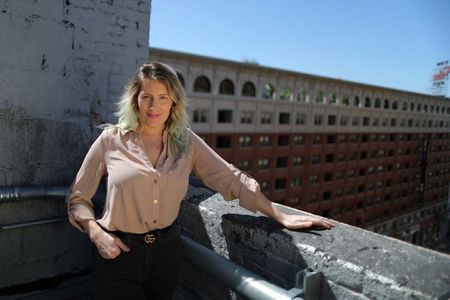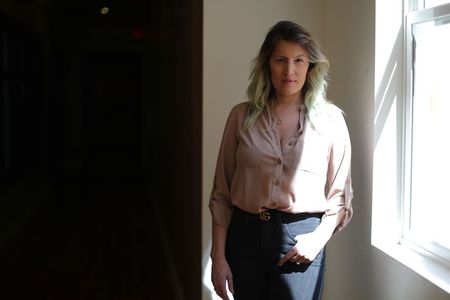By Deena Beasley
(Reuters) – As Los Angeles begins to emerge from more than two months of coronavirus lockdown, 40-year-old Marisa Sullivan will have surgery this week to remove a malignant tumor from her left breast.
Sullivan’s surgery is set for Monday at Cedars-Sinai Medical Center, which suspended critical medical procedures for weeks to manage a wave of patients with COVID-19, the illness caused by the novel coronavirus. Now hospitals across the country are resuming care beyond the pandemic, introducing new precautions to convince people it is safe to seek treatment. For cancer patients in particular, the risk of contracting the virus in a healthcare facility is a top concern.
Sullivan worked as an events planner before her diagnosis last November with triple-negative breast cancer, an especially aggressive type that does not respond to hormone treatments or genetically targeted therapies. She completed a prescribed chemotherapy regimen in April, and worried that a follow-on surgery to remove the tumor would get delayed.
She now feels fortunate to have access to the care.
“I was thinking all of a sudden I am going to be stuck with a tumor in me in the middle of a pandemic, and surgeries are going to shut down,” Sullivan said in a telephone interview. “I’m lucky I had that May 18 date scheduled. I got it locked in literally last week.”
More than 88,000 Americans have died and over 1.4 million have been infected with the novel coronavirus, which attacks the respiratory system and can trigger an extreme immune response in the most severe cases. People with underlying health conditions, from cancer to diabetes or asthma, are at higher risk of complications or death from COVID-19.
To protect patients like Sullivan, whose immune system is already compromised by her chemotherapy treatments, Cedars-Sinai is conducting surgeries in an annex building rather than the main campus where COVID-19 patients are hospitalized. No visitors are allowed. Two days before the procedure, Sullivan was tested for the virus and the results were negative.
She was already well into her chemotherapy treatments when alarm over a U.S. outbreak of coronavirus began to be raised in late February, adding a new dimension to the emotional trauma and anxiety of dealing with cancer.
“I already felt kind of trapped — I can’t travel, I can’t do a lot of things, then all of a sudden the whole world can’t go to a party or go to a bar,” Sullivan said.
Nurses at the Beverly Hills cancer care center where she received chemotherapy infusions started wearing more and more protective gear – gloves, masks, and gowns. Hugs and handshakes disappeared, then visitors were banned, a heartbreaking change for the elderly and terminally-ill, as well as younger, first-time patients.
For her final infusion in April, Sullivan had planned a small party at the infusion center with a few friends, cake and maybe some unauthorized champagne, but the plans were scrapped as the lockdown rules took effect.
“All of a sudden I was sitting there alone,” she said. “I did still wear a red dress and lipstick – I wanted to feel my greatest.”
After her surgery, she will find out whether the cancer has spread beyond the breast, into lymph nodes or elsewhere. If all goes as she hopes, the chemo will have done its job to shrink the tumor and all she will need is follow-up radiation.
Sullivan plans to take a week or two to recover, then will drive cross-country to her mother’s home in Florida, where she has already arranged to undergo prescribed radiation treatment at Moffitt Cancer Center in Tampa. Sullivan appreciates that many people will be able to return to a more normal way of life in the reopening, but thinks wistfully of a trip to Paris with her husband that was derailed by the cancer diagnosis.
“Everyone is thinking of living again – traveling, going to a restaurant and having a glass of wine,” she said. “Now my mom’s house is my Paris.”
(Reporting By Deena Beasley; editing by Diane Craft)



